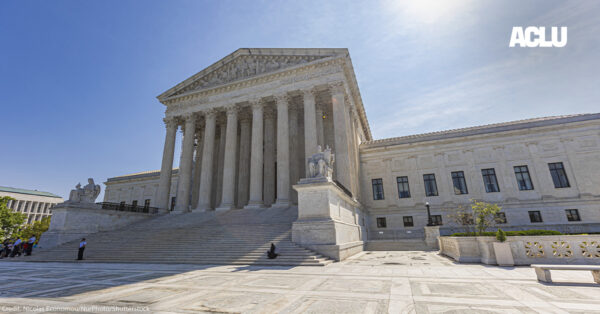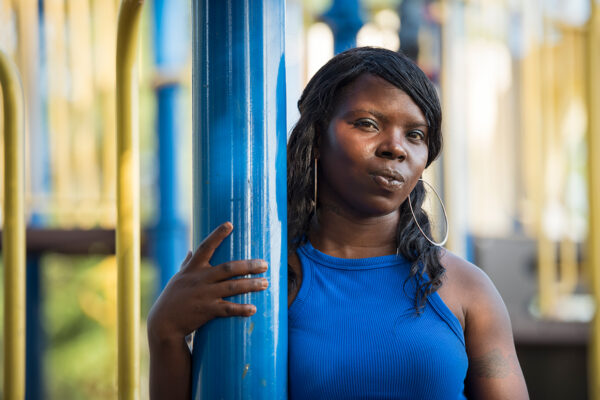Race and Criminal Justice
Fund for Empowerment v. Phoenix, City of
Fund for Empowerment is a challenge to the City of Phoenixâs practice of conducting sweeps of encampments without notice, issuing citations to unsheltered people for camping and sleeping on public property when they have no place else to go, and confiscating and destroying their property without notice or process.
Status: Ongoing
View Case
Learn About Race and Criminal Justice
Featured
Court Case
Jun 2020

Race and Criminal Justice
Defy Ventures, Inc. v. Small Business Administration
Suing the Trump administration to lift its unlawful exclusion of businesses owned by people with criminal records from being eligible for Paycheck Protection Act funds
All Cases
18 Race and Criminal Justice Cases

U.S. Supreme Court
Sep 2024
Race and Criminal Justice
Racial Justice
Carpenter v. United States
This case concerns the First Step Act of 2018, in which Congress made major reductions to the mandatory minimum sentences for certain federal drug and firearm offenses. These changes result in sentences many decades shorter than were required under the previous laws. The question in this case was whether people who were initially sentenced prior to enactment of the First Step Act, but whose sentences were vacated and remanded for resentencing after enactment of the law, can benefit from its major reductions in applicable mandatory minimums. For defendants like Mr. Carpenter, who was originally sentenced to a draconian 116 years in prison as a result of the pre-First Step Act mandatory minimums, applying the First Step Act can mean the difference between dying in prison and having the opportunity to eventually go free. Unfortunately, although there is a split among federal courts of appeals on this question, the Supreme Court denied cert in this case in February 2024.
Explore case
U.S. Supreme Court
Sep 2024

Race and Criminal Justice
Racial Justice
Carpenter v. United States
This case concerns the First Step Act of 2018, in which Congress made major reductions to the mandatory minimum sentences for certain federal drug and firearm offenses. These changes result in sentences many decades shorter than were required under the previous laws. The question in this case was whether people who were initially sentenced prior to enactment of the First Step Act, but whose sentences were vacated and remanded for resentencing after enactment of the law, can benefit from its major reductions in applicable mandatory minimums. For defendants like Mr. Carpenter, who was originally sentenced to a draconian 116 years in prison as a result of the pre-First Step Act mandatory minimums, applying the First Step Act can mean the difference between dying in prison and having the opportunity to eventually go free. Unfortunately, although there is a split among federal courts of appeals on this question, the Supreme Court denied cert in this case in February 2024.

Iowa
Feb 2024
Race and Criminal Justice
Racial Justice
State of Iowa v. Lawrence George Canady III
In this case, the Iowa Supreme Court considered when rap lyrics are admissible evidence in criminal trials. The State sought further review of a court of appeals decision which reversed the defendant's criminal convictions and remanded for a trial based on errors in the admission of evidence. Together with the Speech, Privacy, and Technology Project and the ACLU of Iowa, the State Supreme Court Initiative filed an amicus brief arguing that such evidence should usually be excluded because it is rarely probative and yet creates a high risk of prejudice to the defendant. The Iowa Supreme Court ultimately reversed the Court of Appeals decision, but for narrow and fact-specific reasons. And the Iowa Supreme Court acknowledged that, in cases not involving the peculiar facts of Canady's case, other courts had expressed concerns about the risk that a jury will unfairly use rap lyrics and music as evidence of a defendant's guilt.
Explore case
Iowa
Feb 2024

Race and Criminal Justice
Racial Justice
State of Iowa v. Lawrence George Canady III
In this case, the Iowa Supreme Court considered when rap lyrics are admissible evidence in criminal trials. The State sought further review of a court of appeals decision which reversed the defendant's criminal convictions and remanded for a trial based on errors in the admission of evidence. Together with the Speech, Privacy, and Technology Project and the ACLU of Iowa, the State Supreme Court Initiative filed an amicus brief arguing that such evidence should usually be excluded because it is rarely probative and yet creates a high risk of prejudice to the defendant. The Iowa Supreme Court ultimately reversed the Court of Appeals decision, but for narrow and fact-specific reasons. And the Iowa Supreme Court acknowledged that, in cases not involving the peculiar facts of Canady's case, other courts had expressed concerns about the risk that a jury will unfairly use rap lyrics and music as evidence of a defendant's guilt.

Michigan
Jan 2024
Race and Criminal Justice
+2 Issues
Williams v. City of Detroit
This case seeks to hold Detroit police accountable for the wrongful arrest of our client due to officersâ reliance on a false match from face recognition technology.
Explore case
Michigan
Jan 2024

Race and Criminal Justice
+2 Issues
Williams v. City of Detroit
This case seeks to hold Detroit police accountable for the wrongful arrest of our client due to officersâ reliance on a false match from face recognition technology.

South Carolina
Mar 2023
Race and Criminal Justice
Racial Justice
Brown v. Lexington County, et al
This case is part of a nationwide fight against criminalization of poverty and, specifically, debtors' prisons. On June 1, 2017, the ACLU's Racial Justice Program, the ACLU of South Carolina, and Terrell Marshall Law Group PLLC filed a federal lawsuit challenging the illegal arrest and incarceration of indigent people in Lexington County, South Carolina, for failure to pay fines and fees, without determining willfulness or providing assistance to counsel. Those targeted by this long-standing practice could avoid jail only if they paid the entire amount of outstanding court fines and fees up front and in full. Indigent people who were unable to pay were incarcerated for weeks to months without ever seeing a judge, having a court hearing, or receiving help from a lawyer. The result was one of the most draconian debtorsâ prisons uncovered by the ACLU since 2010.
Explore case
South Carolina
Mar 2023

Race and Criminal Justice
Racial Justice
Brown v. Lexington County, et al
This case is part of a nationwide fight against criminalization of poverty and, specifically, debtors' prisons. On June 1, 2017, the ACLU's Racial Justice Program, the ACLU of South Carolina, and Terrell Marshall Law Group PLLC filed a federal lawsuit challenging the illegal arrest and incarceration of indigent people in Lexington County, South Carolina, for failure to pay fines and fees, without determining willfulness or providing assistance to counsel. Those targeted by this long-standing practice could avoid jail only if they paid the entire amount of outstanding court fines and fees up front and in full. Indigent people who were unable to pay were incarcerated for weeks to months without ever seeing a judge, having a court hearing, or receiving help from a lawyer. The result was one of the most draconian debtorsâ prisons uncovered by the ACLU since 2010.

South Carolina
Feb 2023
Race and Criminal Justice
+2 Issues
CYAP v. Wilson
The American Civil Liberties Union filed a federal lawsuit challenging South Carolinaâs âdisturbing schoolsâ and âdisorderly conductâ laws. The laws allowed students in school to be criminally charged for normal adolescent behaviors including loitering, cursing, or undefined âobnoxiousâ actions on school grounds and encouraged discriminatory enforcement against Black students and students with disabilities. The Fourth Circuit Court of Appeals affirmed the district court ruling that enforcing these laws against students was unconstitutional, affirming that subjecting students to criminal penalties under such vague rules interferes with their education and their future, and produces stark racial disparities. This decision should be instructive to the many school districts across the country where students continue to be charged with âdisorderly conductâ and similar vague crimes.
Explore case
South Carolina
Feb 2023

Race and Criminal Justice
+2 Issues
CYAP v. Wilson
The American Civil Liberties Union filed a federal lawsuit challenging South Carolinaâs âdisturbing schoolsâ and âdisorderly conductâ laws. The laws allowed students in school to be criminally charged for normal adolescent behaviors including loitering, cursing, or undefined âobnoxiousâ actions on school grounds and encouraged discriminatory enforcement against Black students and students with disabilities. The Fourth Circuit Court of Appeals affirmed the district court ruling that enforcing these laws against students was unconstitutional, affirming that subjecting students to criminal penalties under such vague rules interferes with their education and their future, and produces stark racial disparities. This decision should be instructive to the many school districts across the country where students continue to be charged with âdisorderly conductâ and similar vague crimes.
